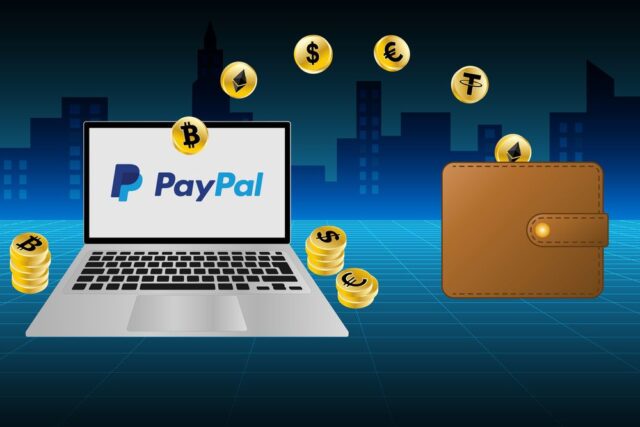PayPal’s latest crypto expansion signals the payment giant’s growing ambition in the blockchain space. By enabling U.S. business accounts to buy, hold, sell, and transfer cryptocurrencies, PayPal is positioning itself as a pivotal player in the digital currency ecosystem. This move follows the launch of its stablecoin, PayPal USD (PYUSD), and ongoing integration with multiple blockchain networks, underscoring the company’s broader strategy to lead the fintech revolution. But will this shift be enough to maintain PayPal’s dominance in an increasingly competitive crypto landscape?
Expanding Utility for U.S. Merchants
On September 25, 2024, PayPal announced that U.S. merchants can now manage cryptocurrencies directly from their business accounts. This new functionality allows business owners to buy, hold, and sell digital currencies like Bitcoin and Ethereum. They will also be able to transfer crypto externally to third-party wallets. This expansion mirrors services already available to individual users on PayPal since 2020. It’s a critical step toward enhancing the utility of cryptocurrencies for businesses.
By offering crypto services to business accounts, PayPal seeks to meet increasing demand from merchants looking to participate in the growing crypto economy. U.S. merchants, except those in New York due to regulatory restrictions, can now seamlessly integrate digital assets into their operations. They can manage cryptocurrency alongside traditional payment methods.
Building on a Strong Foundation
This move aligns with PayPal’s broader blockchain strategy, which began in 2020 when the company first allowed consumers to engage with cryptocurrencies on its platform. In 2023, PayPal took another leap forward by launching its own U.S. dollar-pegged stablecoin, PayPal USD (PYUSD), issued by Paxos Trust Company. The stablecoin is fully backed by U.S. dollar deposits and is now supported on multiple blockchains, including Solana. PYUSD’s integration with PayPal’s Xoom service also enables fee-free international money transfers when using the stablecoin. It showcases the company’s commitment to advancing financial inclusion.
The ability for businesses to use PYUSD and other cryptocurrencies opens up new opportunities for cost-effective cross-border transactions, especially for small and medium-sized enterprises (SMEs). Furthermore, PayPal integration with multiple blockchains gives merchants flexibility and control over how they manage their crypto assets, signaling PayPal’s ambition to leverage the best of decentralized finance (DeFi).
A Strategic Gamble in a Competitive Landscape
While PayPal’s move into business crypto accounts is significant, it is not without challenges. The company faces stiff competition from established crypto exchanges such as Coinbase, Kraken, and Binance. These exchanges offer more comprehensive crypto services and are deeply integrated into the blockchain ecosystem. They give businesses and consumers greater control over their digital assets through decentralized wallets and smart contracts.
Moreover, traditional financial institutions, sensing the growing interest in digital currencies, are increasingly offering their own blockchain solutions. For instance, Mastercard and Visa have developed crypto-related services catering to businesses. That is a highly competitive market for PayPal to navigate.
Despite this, PayPal’s unique position as a globally trusted payment platform offers it a distinct advantage. It integrated cryptocurrency services into its familiar and widely used interface, lowering the entry barriers for merchants who may be hesitant to engage with newer, less established platforms. Additionally, it can provide both centralized services and decentralized financial tools, such as on-chain crypto transfers. That allows PayPal to cater to a diverse range of business needs.
What Lies Ahead for PayPal
PayPal venturing into crypto for businesses could solidify its leadership in the fintech space, especially as more merchants look to adopt cryptocurrencies and businesses seek to integrate crypto as a payment method. Maintaining a competitive edge will require further innovation from PayPal. In particular, the company must focus on providing more DeFi-related services that give merchants greater autonomy over their digital assets.
PayPal’s continuous investments in the blockchain space are evident through initiatives like integrating PYUSD into the Solana network. Adding Ethereum Name Service (ENS) for easier crypto transactions further highlights the company’s commitment to expanding its crypto footprint. Whether this will be enough to fend off competition from crypto-native platforms remains to be seen. However, PayPal’s efforts to blend the worlds of traditional finance and blockchain technology are undoubtedly reshaping the payments landscape.
>>> Read more: SEC Settles with TrustToken and TrueCoin Over Fraud Allegations
PayPal’s latest crypto expansion for business accounts is a strategic step toward consolidating its role in the rapidly evolving digital currency ecosystem. By offering centralized and decentralized features, PayPal positions itself as a versatile platform, capable of meeting the needs of businesses looking to engage with crypto. Yet, in a fiercely competitive market, PayPal must keep innovating to retain its edge and become a dominant force in the blockchain space.
Readers’ frequently asked questions
Why did PayPal extend crypto services to business accounts, and how does this benefit merchants?
PayPal’s extension of crypto services to business accounts responds to increasing demand from merchants for digital currency capabilities. Since its initial crypto offering for consumers in 2020, businesses have sought similar tools to manage and transact with cryptocurrencies. This move benefits merchants by streamlining crypto transactions within the familiar PayPal ecosystem. It makes it easier for businesses to integrate digital currencies into their payment flows. Merchants can use cryptocurrencies for various purposes. They can accept payments from crypto-savvy customers, diversify their payment options, or engage in cross-border transactions more efficiently. Additionally, PayPal’s integration with multiple blockchains, such as Solana, allows businesses to benefit from faster, cost-effective transactions, particularly when using PayPal USD (PYUSD) for international transfers.
What specific features make PayPal’s crypto offering appealing to merchants?
Beyond the ability to buy, hold, and sell cryptocurrencies, PayPal offers features designed to make crypto management straightforward for businesses. For instance, U.S. merchants can now transfer cryptocurrencies to third-party wallets, making it easier to move assets into decentralized environments. This flexibility allows merchants to interact with both centralized and decentralized finance (DeFi) ecosystems, opening up new use cases. E.g. they can access liquidity in decentralized exchanges or participate in blockchain-based finance solutions. Moreover, PayPal’s integration of stablecoins like PYUSD enables businesses to use digital currencies for international transfers without the volatility risk typically associated with crypto assets. This feature is especially advantageous for small and medium-sized enterprises (SMEs) that frequently deal with international transactions but want to avoid traditional currency conversion fees.
How does PayPal plan to evolve its crypto services to remain competitive in the blockchain space?
While PayPal has established itself as a trusted platform for crypto transactions, it must continue innovating to stay competitive in the fast-evolving blockchain space. The company’s current offerings cater to merchants looking for convenience and a smooth transition into digital currencies. However, competitors like Coinbase and Binance offer more advanced tools for managing crypto assets, such as decentralized wallets, staking, and broader token support. To bridge this gap, PayPal may need to expand its DeFi capabilities or explore deeper integrations with decentralized applications (dApps). Furthermore, as regulation around cryptocurrencies continues to develop, PayPal’s ability to navigate these challenges while offering secure, innovative features will be crucial for maintaining its foothold. Ongoing enhancements in blockchain interoperability, such as PYUSD’s availability on multiple chains, suggest that PayPal is positioning itself for greater flexibility and user control over digital assets.
What Is In It For You? Action Items You Might Want to Consider
Consider Diversifying into Stablecoins Like PYUSD for Cross-Border Transactions
With PayPal’s integration of its stablecoin, PayPal USD (PYUSD), businesses can now leverage a U.S. dollar-pegged crypto asset for international transactions. If you’re trading across borders, using PYUSD could help minimize conversion fees and volatility risks associated with other cryptocurrencies. PayPal’s support for multi-blockchain operations, such as Solana, offers faster and more cost-effective transfers. This makes it a compelling tool for efficient trading. Start exploring how PYUSD might fit into your global strategy for reducing costs and maintaining stable liquidity.
Leverage PayPal’s New On-Chain Transfer Capabilities for Enhanced Flexibility
PayPal now allows merchants to transfer cryptocurrencies to external wallets. This feature could benefit traders by offering more control over their assets. If you’re using DeFi platforms or prefer managing your digital currencies in external wallets, this new capability opens up more possibilities for trading strategies. Consider taking advantage of this on-chain transfer feature to diversify how you store and manage your crypto holdings, especially if you trade across multiple wallets or exchanges.
Monitor Regulatory Updates, Especially if Trading in New York
While PayPal’s new crypto services are accessible to U.S. merchants, they are currently unavailable in New York due to state regulations. If you’re a trader operating in multiple states, it’s essential to stay informed about potential regulatory changes that might impact your ability to use PayPal’s services in New York or other regions with stringent crypto laws. Keep an eye on developments to ensure that you’re positioned to take advantage of new tools as they become available.











[…] entry marks a new phase of legacy fintech transformation. PayPal has its own stablecoin (PYUSD). Stripe is testing blockchain-based remittances. Adyen supports tokenized wallet flows. ACI’s […]
[…] 430+ million consumer and merchant accounts to drive mainstream adoption. Unlike competitors, PYUSD integrates directly into PayPal’s existing payment infrastructure, allowing users to send, spend, or convert the stablecoin without understanding blockchain […]